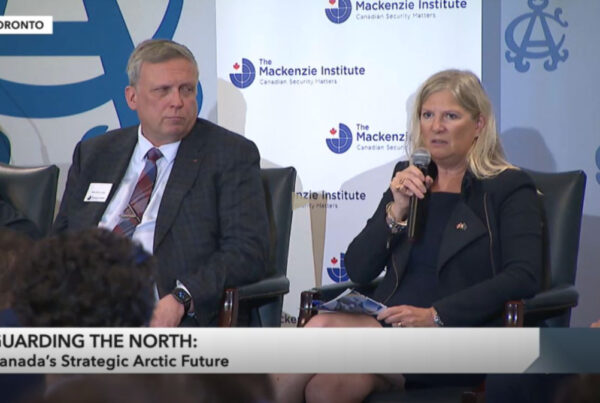Above: Major Tony Balasevicius, of the Concept Group at the Canadian Army Land Warfare Centre; Dr. Whitney Lackenbauer, Professor at St. Jerome’s University and the University of Waterloo; and H.E. Anne Kari H. Ovind, Ambassador of Norway to Canada, discuss protecting Canada’s north and Arctic sovereignty at our conference, “Canada’s Defence Policy Review: The Geopolitical Context 2020-2050” held on January 31, 2017 at the Royal Canadian Military Institute.
Major Tony Balasevicius retired from the Canadian Armed Forces (CAF) in 2013. He is currently a Reserve Infantry Officer working in the Concept Group at the Canadian Army Land Warfare Centre in Kingston. During his career, he served in a variety of staff and command positions. This has included the Directorate of Land Requirements, military faculty (DS) in the Department of Applied Military Science at The Royal Military College, the Directorate of Future Security Analysis, and the Canadian Forces Intelligence Command. He was the principle author of the CAF’s Arctic Integrating Concept. During the last few years he has focused his research efforts on Arctic security, the Russian military buildup in the Arctic, Russian military transformation, and hybrid warfare. Major Balasevicius is a graduate of the Royal Military College with a Master’s degree in War Studies. He has completed Canadian Land Forces Command and Staff College, and the Army Technical Staff Officers Programme. He has published numerous works on a variety of military subjects.
Dr. Whitney Lackenbauer is a Canadian historian and frequent commentator on contemporary circumpolar affairs. Born and raised in Kitchener, he completed his undergraduate studies at St. Jerome’s University and returned to his alma mater as a faculty member soon after completing his Doctorate. Although actively engaged in various research programmes related to Canadian defence, foreign policy, and Arctic issues, he is passionate about undergraduate teaching as an outlet for his passion and enthusiasm for all aspects of Canadian history. Dr. Lackenbauer was a Fulbright Fellow at Johns Hopkins University in 2010 and a Canadian International Council Research Fellow from 2008 until 2009. He has travelled extensively with the Canadian Rangers from coast to coast over the last decade, and he was made Honourary Lieutenant Colonel of the 1st Canadian Ranger Patrol Group in 2014. His current research includes Arctic sovereignty and security issues since the Second World War; the Canada-United States Joint Arctic Weather Station (JAWS) Program, which operated in the High Arctic from 1947-1972; the history of the Distant Early Warning (DEW) Line; and the evolution of Canada’s Northern strategies.
H.E. Anne Kari H. Ovind presented her credentials to the Right Honourable Governor General David Johnston on January 26th, 2016 and became Norway’s Ambassador to Canada. She has served in the Ministry of Foreign Affairs for more than 20 years. Most of her career has been in the field of security policy, including Arctic affairs, bilateral relations with Russia, and NATO affairs. From 1999 to 2002 she served at the Norwegian Delegation to NATO in Brussels. She also has extensive multilateral experience from responsibilities within climate change, sustainable development and management of natural resources in the Ministry of Foreign Affairs. Over the past six years, her work has focused on implementing Norway’s Arctic policy, including co-ordination across all ministries to produce a coherent and comprehensive policy, the Arctic Council and regional co-operation and bilateral relations in the field of Arctic affairs. She attended the National Defence College in 2004. Her formal education comprised a Master of Science in Economics and Business Administration from the Norwegian School of Business and Administration (Bergen), a Master of Arts in European Integration Economics from the College of Europe (Bruges) and a Master of Science in Sea Use Law, Economics and Policy from the London School of Economics and Political Science.








